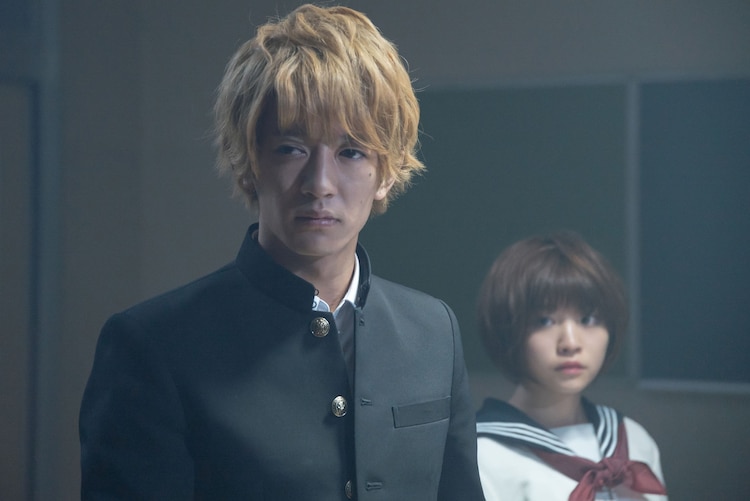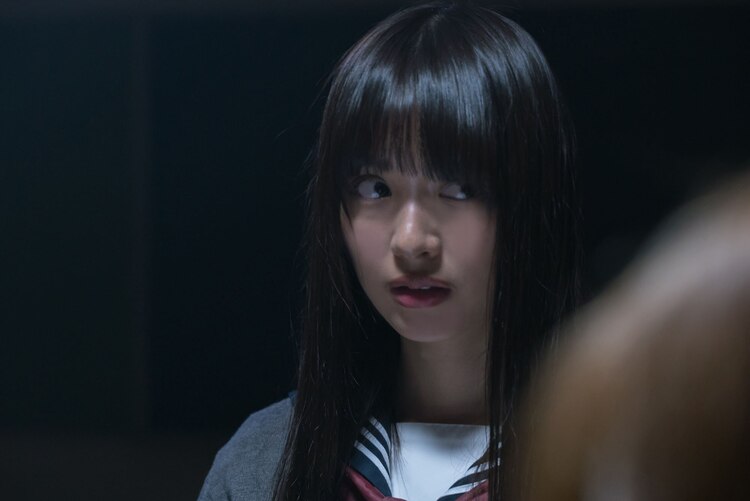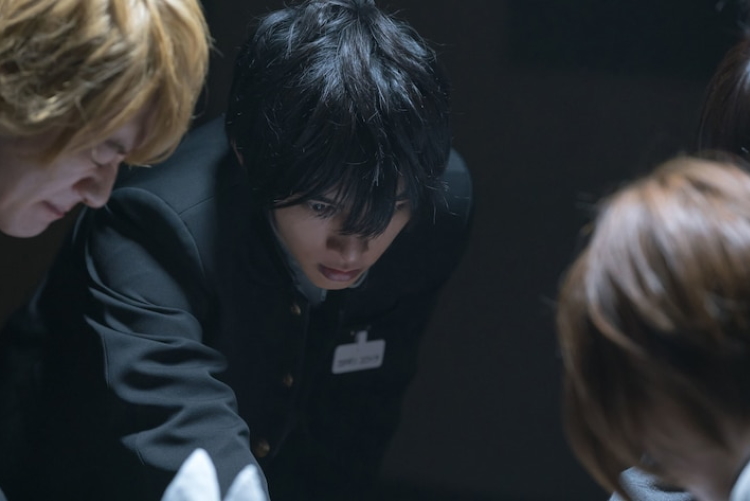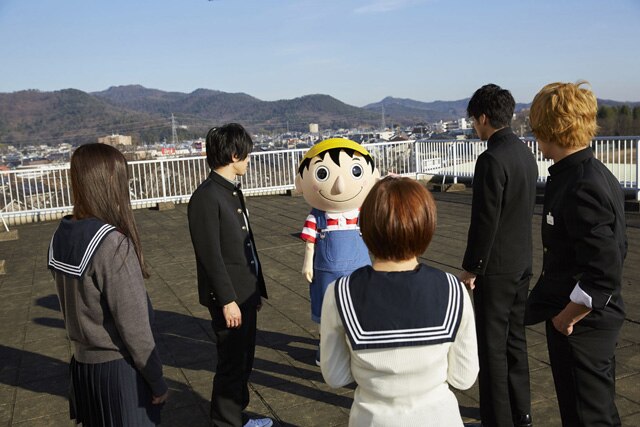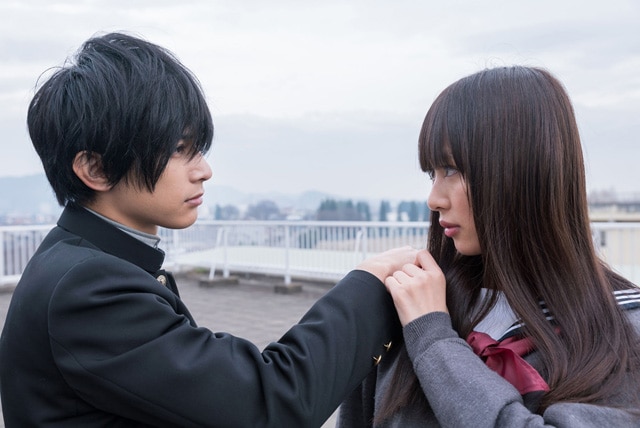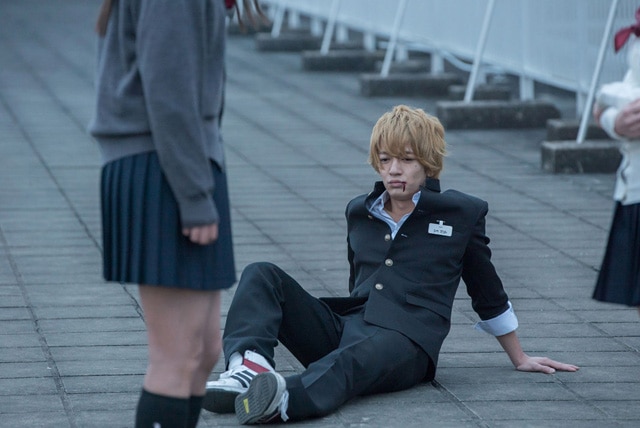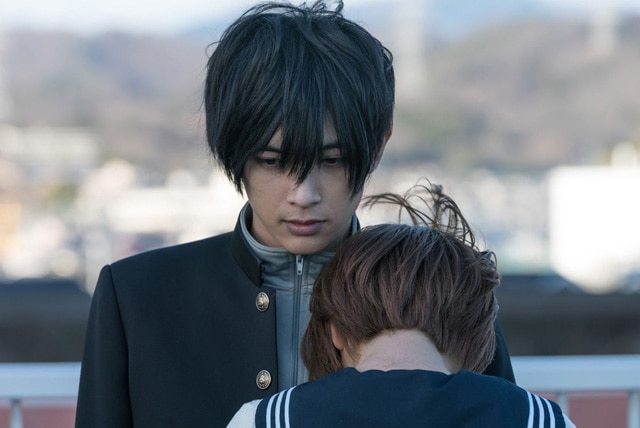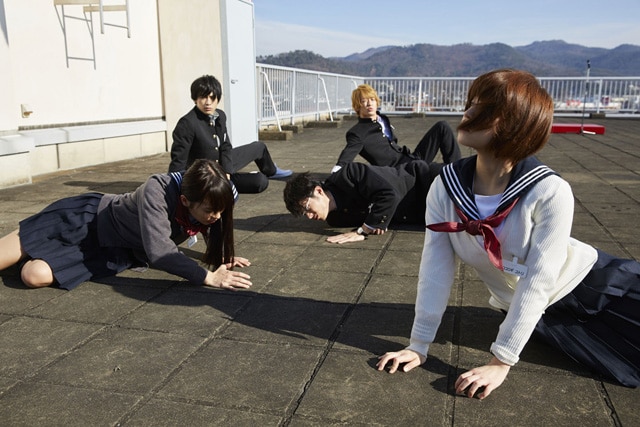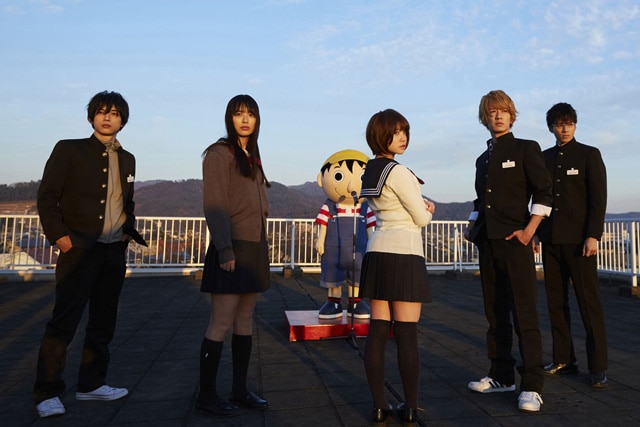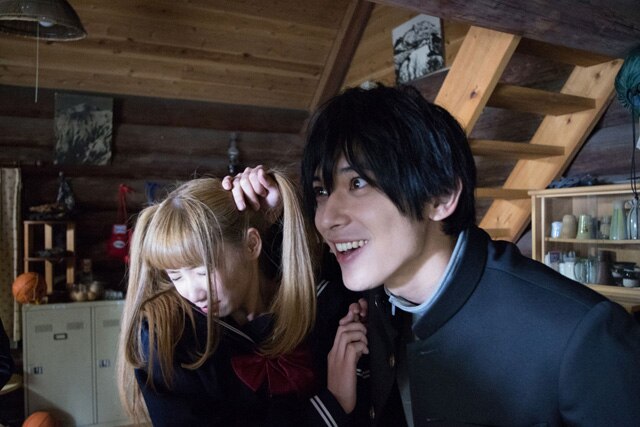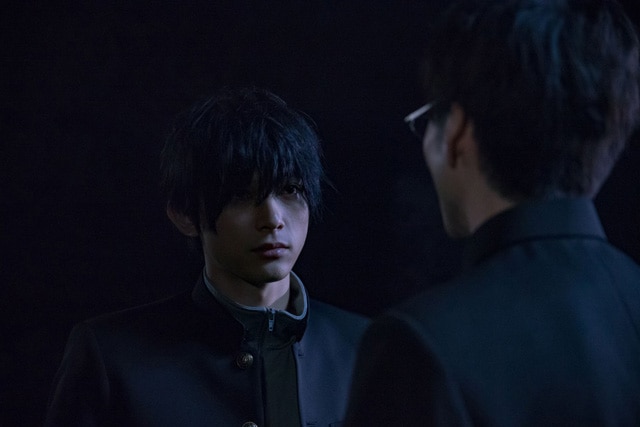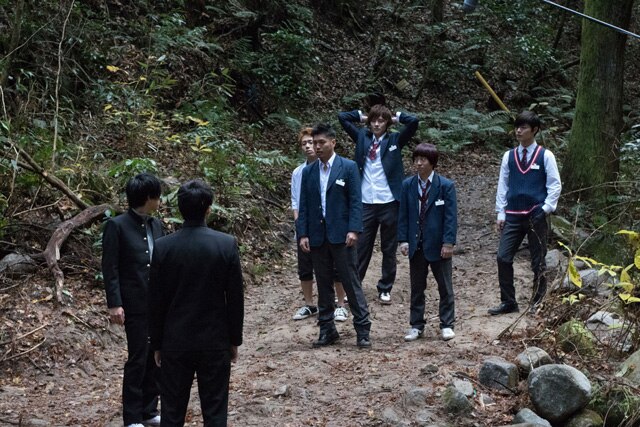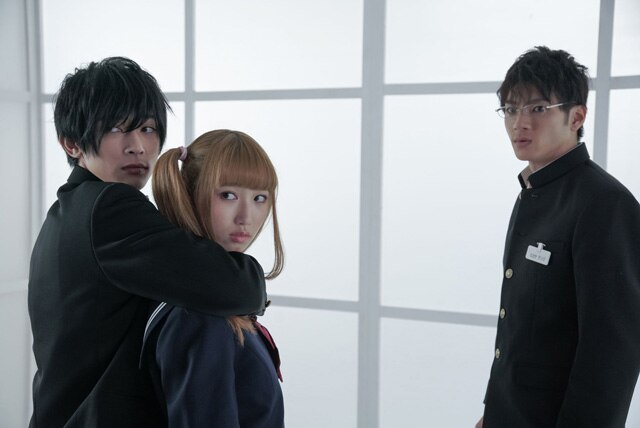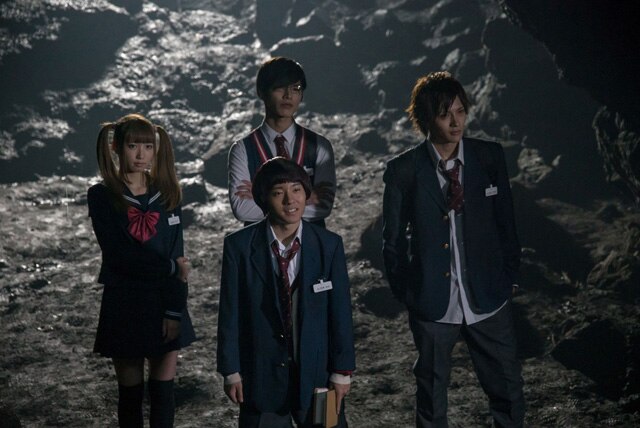Yamaguchi Mikoto’s Tomodachi Game might not be one of the most known manga series – despite first launching in December 2013 and still continuing now – but it managed to receive not just one, but two LA movie adaptations as well as a four episode drama. I personally checked the drama around the time it was released in 2017, and the first movie whenever it was available the year after. But now that I’ve recently been able to watch the final movie, it’s time for a review of sorts.
Katagiri Yuuichi, played by Yoshizawa Ryo, is a poor high schooler who spends his spare time working odd jobs to save up for his class’ trip. Believing that friends are more important than money, he doesn’t want to give up his chance to join them. After all the money is collected, however, a part of it gets stolen. Two of Yuuichi’s precious friends, class president Sawaragi Shiho (Uchida Rio), and Shibe Makoto (Okura Shimon), are the prime suspects. Their classmates get suspicious, assumptions arise, but before they can do anything about it the five friends wake up in the middle of a white room with no idea how they even got there. Not until an anime mascot shows up, telling them they’ve been entered into the Tomodachi Game.
While Tomodachi Game sounds like your next best battle royale scenario – that’s what I assumed it was as well before reading the synopsis – it is much more of a gambling one instead. The title can actually be taken very literally. It’s just a game of friends. The five of them get pulled into a series of games, testing their friendship bonds. From having to answer the same thing to a question without being able to even say as much as a word, to having their secrets spilled for the world to hear, and a game of hide-and-seek which at its core is about nothing but how much one can trust another. Tomodachi Game is nothing but a test to see how far they are willing to go to keep up their happy friend facade while their worst fears become reality, and their darkest secrets seep out.
First the drama, then the movies
It’s true there are two movies and a drama to watch, but in contrast to most other projects, Tomodachi Game basically made it a requirement for you to watch them all. Originally, I was of the idea the drama was a pre-movie prequel showing some background info they couldn’t fit in the actual movie- like, an introduction of the main characters and their lives or something. But while it introduced the setting, the eventual players, and the game, it then also moved on to its first stage. Skipping the drama would mean skipping the first level of Tomodachi Game and believe me, dropping into the movie with no prior knowledge will make it feel even more absurd than the whole setting already is.
The Tomodachi Game drama starts off with a quick summary of ~the life of Katagiri Yuuichi~ and near immediately gives us a glimpse of his cleverness when confronted with what is obviously a – not so very good – swindler of sorts. Yuuichi quickly notices the guy is up to no good, and rather than being led on his trail, he swaps their positions, making himself the game master instead. And with that the tone is set and expectations for the character called Katagiru Yuuichi, only rise.
Let the games begin
It doesn’t take long for the real story to kick in, and our five little friends and classmates find themselves swept into a Tomodachi Game to prove the worth of their bonds goes above the worth of money. Will they prevail while knowing one of them stole the class trip funds? Will they manage when hearing there’s someone with a huge debt among them? What will they do when the games won’t go as they’d thought they would, and they’ll only rack up more debt? And who is that weird anime-mascot looking thing called Manabu?
Convinced nothing will be able to sway their friendship, Katagiri, Sawaragi, Shibe, Mikasa Tenji (Yamada Yuki), and Kokorogi Yutori (Nemoto Nagi) courageously start the first game: the famous Kokkuri-san. Five questions will be asked. One for each of the participants. With no words and opinions allowed to be exchanged for the duration of the game, the five have no other choice but to put full trust in each other. And then they get the answer wrong… Is there a traitor among them after all?
Yuuichi’s internal monologue is most definitely the drive behind the drama episodes, as he pulls you along through his candid thoughts. Ups and downs of believing and not believing a traitor to be there. Though when comes down to it, our lead boy has no other option but to assume at least someone is trying to mess up their game, making it so they won’t get out unscathed.
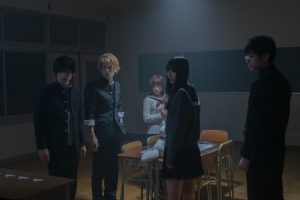 When Yuuichi eventually finds a way to progress through this Kokkuri-san with a twist, and brings the group to the finish line, they are all too glad having made it out. But sadly for them, they’re not even halfway through the game yet. As they wake up on a school’s rooftop, they quickly have to get ready for the second level of this psychological gamble: Kageguchi Sugoroku. While the latter refers to a board game to the likes of Snakes and Ladders, it’s the former word that piques their interest. Kageguchi is basically translated as “malicious gossip” or “backbiting”, so if a traitor is really among them, this next round will no doubt try to tear up some bonds.
When Yuuichi eventually finds a way to progress through this Kokkuri-san with a twist, and brings the group to the finish line, they are all too glad having made it out. But sadly for them, they’re not even halfway through the game yet. As they wake up on a school’s rooftop, they quickly have to get ready for the second level of this psychological gamble: Kageguchi Sugoroku. While the latter refers to a board game to the likes of Snakes and Ladders, it’s the former word that piques their interest. Kageguchi is basically translated as “malicious gossip” or “backbiting”, so if a traitor is really among them, this next round will no doubt try to tear up some bonds.
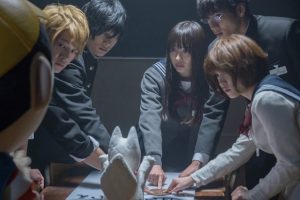
For additional fun, the game is also broadcast online, with a whole lot of viewers already present and anticipating the expected upcoming betrayal. And as if it isn’t hard enough to get to the finish by itself, the ones who’ll actually decide whether the accused is guilty of the rumor or not, and to what degree they are, are the ones looking in. So, aside from trying to figure out how to finish the game with minimal debt, there’s also the matter of the crowd being able to just decide who’s speaking the truth or not without really needing any other proper reason than “I want to see [insert name] suffer”. But again, if you were to try and sabotage the flow from the start, this whole thing might even come in hand depending on how you’d use it.
And yes, you probably guessed it: the traitor does show up again, confirming someone’s not playing by the friends’ rule of not writing down anything when asked. “[insert name] has murdered people.” “[Insert name] has had plastic surgery.” “[Insert name] and [insert name] used to be a couple.” and many, many more. Everyone starts doubting everyone. Jealousy shows. Secrets come to the surface, and fights break out. There is chaos. A lot of it. And if I were the traitor, that would have been exactly my goal. It’s a clever decision too, since you can literally say anything about anyone without any base to instigate something. The one who’s written it down will not have to say a word, no one will know they did it. But the one who gets accused, will have to prove the crowd it’s actually not true. No way to do that? Too bad, here’s your new round of additional debt! As long as the crowd believes the rumor to be reality, the double-crosser remains safe.
What the traitor likely didn’t put much thought in was the other team members’ cleverness, mistakenly thinking Yuuichi was just the nice guy among them. But once he grasps a situation, the guy will figure out how to pull it to his advantage, and this gossip game isn’t an exception. Within a few rounds, Yuuichi doesn’t only manage to force the truth out, but also gets the five of them safely to the end of the game. Or so they thought.
Time for the grand finale
With the end of the second game, comes the start of a third. And this is also when we switch to the second movie. Tomodachi Game Final grabs Tenji and Yuuichi, and drops them in the middle of a huge forest. They quickly bump into what looks like another team of participants – a basketball club even – and jointly walk on to find Manabu again. Our main duo – for now – partners up with another lone participant called Maria – where did she come from, anyway? – after having received the new game’s orders: Yuujou Kakurenbo. Literally, friendship hide-and-seek.
The rules are fairly simple: each team will have a member hide themselves. The team who finds the other team’s hidden member first, wins. Sounds like a regular hide-and-seek to you? Of course it wouldn’t be. There’s only so much you can do with three (Team C – Yuuichi, Tenji & Maria) members against five (Team K – the basketball team) – which even turns two against four once the hiders have gone to hide. The situation gives Yuuichi a lot to think about. Does he try and figure out how to get food to his team’s hider without being followed by his rivals, or does he leave them to struggle by themselves, hoping they won’t eventually press the give up button? Though the biggest issue might just simply be how he’ll manage to find Team K’s hider with four of their members breathing down his neck.
Once the game eventually ends – and Yuuichi’s biggest secret gets spilled along with it – our duo is brought back to the real world, immediately being made aware of things having happened while they were gone. A class in disarray. A huge debt failed to be repaid. A high school dropout. A disappearance. An old friend suddenly showing up. The Tomodachi Game might have ended, but its aftermath still has to be confronted. Besides, who actually got them into this whole mess to begin with?
As Yuuichi and Tenji move forward, joining up with Sawaragi, Kokorogi, and Shibe again, the whole Tomodachi Game arc might finally come to a proper close. Or will it? With a still ongoing manga as we speak, it’s hard to imagine what other roads and stories Yuuichi and his friends might tumble into next.
~Forever Friends~
It’s all about the power of friendship! – wait, no, that’s a whole different type of series. Anyway, behind all that talk of friendship, trust, and also backstabbing, and secrets, there’s the cast who needs to bring the roles from 2D to 3D. While Tomodachi Game as a series isn’t some highly regarded, big budget project – and, to be honest, it never really tries to be – the cast still needs to have the skill to bring out its potential. No matter how much money goes into something, if the character and actor match isn’t right, any project easily fails. And let that be where Yoshizawa Ryo comes in.
It might not be the Amuse actor’s first lead role – 2016’s indie Summer Song took that achievement – but it might be the first one that actually got some widespread attention. Perhaps it was the fans of the manga, or Ryo himself. Or perhaps it was his looks in the trailers: the dark hair and stare, with that playful – though at times sinister – look in his eyes, making you wonder just how deep he’d go. When I first saw the news, I was immediately intrigued, but would he be able to live up to that vibe for the whole project? If you’d ask me this now, I’d definitely say yes, but at the time the drama came out, Yoshizawa Ryo wasn’t as established. It was still a matter of Can he do it or not?
Well, after watching four drama episodes and two whole movies, I can safely say Ryo was on point. Easily going from soft boy to trickster to evil genius and nasty asshole all in the span of a few minutes. As Yuuichi, as a character, doesn’t hold back, Ryo, as the actor, doesn’t either. And that’s how it’s supposed to be. Ryo seems to have a knack for character like this one, and I can only hope he’ll get to play many of them in the future.
Alongside Ryo though, there is Yamada Yuki – YamaYuki for easy recognizing in-between all the industry’s Yukis. As far as I remember, he was pulled into the project on recommendation of Ryo himself – since they are friends – and after getting through all the installments I can totally see why. There is just something very honest about him, no matter what role it is he’s playing, or how the role will eventually turn out to be. It always feels like he jumps into the character’s shoes, and just takes it in completely. His confusion, is confusion. His dread, is dread. And while that sounds very much like how an actor is supposed to act, there’s a certain honesty about him that is hard to explain but shows again and again, only making me even more curious to what he’ll do next. Tomodachi Game, though, was clever enough to take the shot and put him next to Ryo, undeniably launching them as stars of the whole show. I’m convinced that if either one had not been there, the whole dynamic would have likely come tumbling down in a matter of a few scenes. Unless they cast someone else extremely fit for the job, of course.
Though Uchida Rio, who played leading girl and class president Sawarigi Shiho, put down a fine performance, there’s really not much to say about her. At least it is clear that the reason is to be found within the script, and perhaps even the manga, rather than her skill set. Sawarigi – as she was written – just didn’t give any memorable scenes other than perhaps during the climax of the second game when everything just turned to chaos. I found a similar issue with Kokorogi Yutori – played by Dempagumi.inc member Nemoto Nagi – who at some point felt nothing but the “big-boobed accessory” who just needed affection and would turn on anyone in the matter of seconds if that’s what fit her messed up mind. And even though part of those scenes had purpose, and I can’t even really fault her for it, it felt all too stereotypical to take much else from it. If there’s one thing though, that I’ll never forget when it comes to Kokorogi, it’s that crazy batshit look in her eyes, filled with animosity. Nemoto might have been actually able to make the role memorable if she’d had more time and focus as a whole.
Meanwhile, our fifth and last member of the group, rich boy Shibe Makoto, was a whole mess. You could probably put some of the blame on the rich boy stereotype and the facades he was trying to show off, but it was also very obvious that Okura Shimon just isn’t all that experienced as an actor. Was it bothersome? Nah, not really, but it was rather forgettable, and even laughable at times too. While Ryo and YamaYuki, and Uchida and Nemoto, all flowed from scene to scene, making all parts of their characters somehow fit together, Shibe lacked subtlety. It felt like whenever he needed to show a specific emotion, he just grabbed that one from an imaginary wardrobe, and dropped it onto the scene, without naturally flowing from one side of the character to another. It might not make a whole lot of sense when I’m writing it down like this – also because in the stereotype it somehow worked – but there was just no weight to Shimon’s acting as Shibe. Though I have to give it to him that a slight bout of insanity at some point in the story felt at least ten times more genuine than about 95% of his other scenes.
Someone who deserves a special shoutout is young Amuse actor Uragami Seishuu – who most people will likely remember for having played Kamiki Ryunosuke’s little brother in two separate projects many years ago. While he only appears in the final movie, his performance as Shinomiya Kei made me unable not to say “CREEP” out loud. His whole vibe was on point. Craziness sitting in his eyes no matter what it was he was doing, and instantly making you wonder whether you’re misinterpreting every single thing that’s being said and done. I’m curious to see how his career will evolve from here on out.
Next to Uragami, YouTuber Silk Road (Fischer’s) also made an appearance as the token dumb one with a good heart of the basketball team, probably getting the most focus among them. His fellow team members played by Uematsu Daisuke, Machiyama Hirohiko, and Zaiki Takuma, barely got enough screen time other than to confirm their looks were as stereotypical as their roles. I mean, the stoic team captain, the good looking flirt, and the clever megane says enough to me.
Ueno Yuuka and Kamen Rider alumni Kubota Yuki were cast as the game masters, here and there pulling some strings when needed to get the games going. Also on their side was Manabu, the anime-looking mascot. Singer/Utaite and occasional voice actor Amatsuki was responsible not only for voicing Manabu, but also providing the theme song.
So, was it all really worth it?

Perhaps it was, perhaps it wasn’t. It all really depends on what you’re looking for. Do you want something flashy with a lot of action and intrigue? Then Tomodachi Game is definitely out of the question. Do you like to watch and listen to Ryo, YamaYuki, and others talk, and talk, and talk… with a lot of the project’s weight coming down to just about how good these actors are in convincing you their characters are living human beings? Then yes, please do check it out! If you don’t feel like watching everything, the drama’s episodes are pretty short and at least give you a good feel of the thing as a whole!
I don’t think I’ll ever really revisit the Tomodachi Game drama or its movies after this, but even with that I’m glad that I did get to see what some people can manage when they aren’t a slave to the grandness of the character they are trying to portray. The project might have been low-budget – such as the sets being limited to a school ground and building, a few streets probably down the road, and a giant forest where they won’t have to bother trying to make sure the background doesn’t mess with the setting – but that doesn’t mean it can’t be enjoyable to some degree.
Tomodachi Game – in all of its versions – might not be anything amazing, but it is certainly not half bad. Whether or not you’ll appreciate it though, all depends on the type of things you prefer to watch yourself.
 Title: Tomodachi Game (2017.04 – Four Episodes), Tomodachi Game Gekijoban (2017.06), Tomodachi Game Gekijoban Final (2017.09)
Title: Tomodachi Game (2017.04 – Four Episodes), Tomodachi Game Gekijoban (2017.06), Tomodachi Game Gekijoban Final (2017.09)
Director:
Nagae Jiro
Cast:
Yoshizawa Ryo
Yamada Yuki
Uchida Rio
Nemoto Nagi (Dempagumi.inc)
Okura Shimon
Uragami Seishuu
Amatsuki (Voice only)
and more…
Mangaka:
Yamaguchi Mikoto
Serialization:
2013.12 – … (Bessatsu Shounen Magazine)

